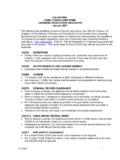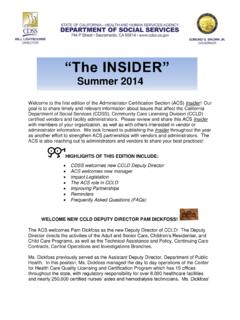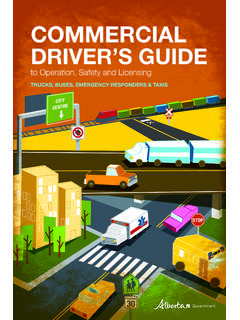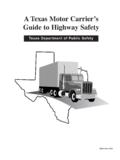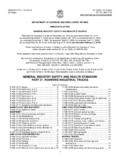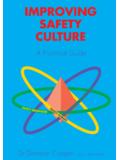Transcription of REFERENCE MATERIAL FOR FACILITY EVALUATION/VISIT
1 REFERENCE MATERIAL FOR FACILITY EVALUATION/VISIT EVALUATOR MANUAL FACILITY EVALUATION/VISIT TABLE OF CONTENTS FACILITY evaluation Repealed 11/03 .. 3-4000 General Statement .. 3-4010 licensing Program Analyst Role .. 3-4100 Identifying Licenses that have been Forfeited .. 3-4120 Possible Forfeiture of License-Sample Forfeiture of License-Sample Review of FACILITY File .. 3-4150 Definition of FACILITY evaluation FACILITY evaluation .. 3-4200 FACILITY evaluation Process Flow Chart .. 3-4210 Use of the Focus visit Reports Repealed 2/1/2000.
2 3-4300 Verbal/Written Consultation (Advisory Notes) .. 3-4400 Misinterpretation of the Regulations .. 3-4500 FACILITY Visits .. 3-4600 Required Annual Visits .. 3-4610 Random Sample Visits .. 3-4620 08RM-02 June 2008 1 EVALUATOR MANUAL FACILITY EVALUATION/VISIT 3-4000 FACILITY evaluation REPEALED 11/03 3-4000 3-4010 GENERAL STATEMENT 3-4010 The purpose of this section is to provide the licensing Program Analyst with a basic understanding of their role and responsibilities and how to conduct a FACILITY evaluation .
3 Emphasis will be placed on the FACILITY evaluation process to enable the licensing Program Analyst to recognize the various degrees of deficiencies and to determine the appropriate course of action because of assessing the total picture. 3-4100 licensing PROGRAM ANALYST ROLE 3-4100 The mission of the Community Care licensing Division is to protect the health and safety of children and adults in out-of-home community care facilities through the administration of a regulatory enforcement program. The licensing Program Analyst is the key staff person who is responsible for carrying out the mission of the Community Care licensing Division in the field.
4 To fulfill this responsibility, the licensing Program Analyst uses the three Community Care licensing Division program components: 1. Prevention - The reduction of predictable harm by screening out unqualified applicants and by providing applicants and licensed providers with information regarding the laws and regulations concerning the operation of Community Care licensing Division facilities. 2. Compliance - The process that ensures that Community Care licensing Division facilities are operated according to applicable laws and regulations. Compliance will be maintained through FACILITY inspection, issuing deficiency notices, and providing consultation regarding the correction of deficiencies.
5 3. Enforcement - A range of corrective actions (from civil penalties to FACILITY closure) taken when a provider fails to protect the health and safety of people in care or is unwilling or unable to maintain compliance with licensing laws and regulations. The licensing Program Analyst has contact with licensees, clients and others. The manner in which the licensing Program Analyst conducts himself/herself is critical to the public image and success of the program. The attitude and approach that the licensing Program Analyst exercises during this contact must reflect the Core Values of the Department: Compassion Treat all people with dignity, fairness and courtesy.
6 Diversity Solicit and listen to all ideas from people of various backgrounds and philosophies. Include these same people in policy and program considerations. Simplification Eliminate unnecessary regulations and paperwork, de-emphasize process, and emphasize goals and outcomes. Service Provide effective and responsive service with skill and integrity. 03RM-10 December 2003 2 EVALUATOR MANUAL FACILITY EVALUATION/VISIT 3-4100 licensing PROGRAM ANALYST ROLE (Continued) 3-4100 The expectation is that services are delivered in a courteous, prompt and professional manner.
7 Rudeness or intimidation is never justified regardless of the level of cooperation from the licensee or FACILITY representative. Unprofessional conduct nullifies or diminishes the authority needed to administer the program. In order to be successful, the licensing Program Analyst must have the ability to develop and sustain a well-balanced and business-like relationship with the licensee. This requires impartial evaluation of facilities to measure compliance, documentation of findings and providing verbal/written consultation. The licensing Program Analyst must be objective and use good judgement when considering the intent of regulations, the context of the violation and the impact on those in care.
8 Improper application of licensing laws and regulations invalidate legitimate citations and are more subject to challenges, appeals and unnecessary correspondence. Advising (consultation) a provider on how to meet a regulatory requirement is an essential part of the licensing Program Analyst role and is used in all three components of the program. The licensing Program Analyst should be able to advise a provider as to how they can meet a regulatory requirement or correct a cited deficiency. licensing Program Analysts have the authority to seek compliance with regulations through providing alternative solutions to a situation.
9 Consultation to seek compliance must be restricted to regulatory requirements. Consultation also includes providing the licensee with information on their rights to appeal decisions and file complaints. There is no requirement that licensing Program Analysts must find some kind of a deficiency every time a site visit is made. The FACILITY evaluation process (Section 3-4200) allows for a variety of actions to be taken by the licensing Program Analyst to facilitate correction. The actions available to the licensing Program Analyst range from issuing citations with very short correction times to not issuing a citation and providing advisory notes under specified conditions.
10 In some instances the licensing Program Analyst may observe conditions that require referral for suspension or revocation of license or involvement by law enforcement agencies. The following sections will provide the licensing Program Analyst with the basic procedures to perform a FACILITY evaluation . 3-4120 IDENTIFYING LICENSES THAT HAVE BEEN FORFEITED 3-4120 As part of effective caseload management, it is necessary to maintain an accurate database of currently licensed facilities. A well maintained database will prevent unnecessary site visits and provide management with accurate information that can be used in planning caseload assignments and allocating personnel.
